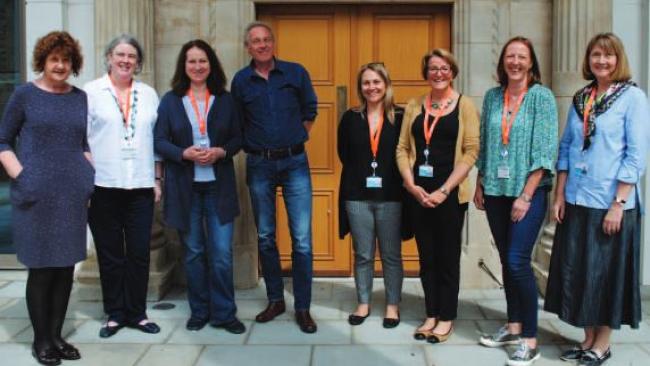
Lisa Jardine
On her election in 1976, Lisa Jardine became the College's first woman Fellow. She was an Honorary Fellow from 2006.
Early life and time at Cambridge
Lisa Anne Jardine (1944-2015) was the eldest daughter of Rita and Jacob Bronowski. She initially studied Mathematics at Newnham College but transferred to English in her final year, partly as a result of the influence of Raymond Williams (a Fellow of 汤头条原创).
Graduating in 1966, she went on to gain an MA from the University of Essex. She then undertook a Cambridge PhD, with the resulting dissertation published in book form as Francis Bacon: Discovery and the Art of Discourse (1974).
She gained experience of teaching in several academic institutions before becoming a Fellow of King鈥檚 College, Cambridge, and shortly afterwards being elected to a fellowship at 汤头条原创. In this historic move, in April 1976, the College chose her as its first female Fellow. She remained here, teaching English, until 1989.
London professorships
In 1990 Jardine began a new phase of life at Queen Mary, University of London, where she was to be based for more than 20 years. During that time she was Head of the English Department, Dean of the Faculty of Arts, and Centenary Professor of Renaissance Studies.
Her research interests led her to found the Centre for Editing Lives and Letters, which she took with her when she moved to University College, London in 2012. There she was Professor of Renaissance Studies, and Director of the UCL Centre for Humanities Interdisciplinary Research Projects (CHIRP).
Author and broadcaster
Her boundless intellectual curiosity and enthusiasm for communicating ideas to a wide audience made her not only an inspiring teacher but a successful author, lecturer, and broadcaster. Her very numerous publications ranged widely through the fields of literature, art, science, and cultural history, particularly of the Renaissance and the 17th century.
She produced a study of the era of the early Royal Society in Ingenious Pursuits (1999) and biographies of Robert Hooke and Christopher Wren. The book Going Dutch: How England Plundered Holland鈥檚 Glory (2008) examined how Dutch thinkers and scientists influenced England鈥檚 intellectual landscape in the 17th century; it won the 2009 Cundill International Prize in History.
Her work in broadcasting included hosting Night Waves (a BBC Radio 3 arts programme); on BBC Radio 4 she was a frequent contributor to Start the Week, Question Time, Any Questions, the arts review programme Kaleidoscope, and the essay series A Point of View. In 2013 she presented a Seven Ages of Science series for Radio 4.
Public life
Her career as a public figure included membership of the Council of the Royal Institution (until 2009), an advisory role at the Royal Society, and chairmanship of the Human Fertilisation and Embryology Authority (2008-14).
As Bronowski's daughter
In her early life, she was very aware of the hazards of becoming known as her father's daughter. She was glad to take on a different surname when she married Nick Jardine (historian and philosopher of science) in 1969; she chose to continue using the Jardine name following their divorce ten years later, and after her subsequent marriage to John Hare (1982).
But the interdisciplinary breadth of her intellectual interests was clearly something she inherited from her father, and in later life she was happy to acknowledge this and the extent of her debt to him.
Having begun investigations aimed at writing his biography, she unearthed papers that revealed unexpected aspects of his early life, especially his participation in war related mathematical tasks in the 1940s. This led her to compile and present a television programme - My Father, The Bomb and Me (BBC Four, 2011) - which explored this history and reflected upon the ethics of science in wartime.
She became concerned about the fate of her father's papers, the greater part of which had been deposited by her mother at the University of Toronto, while some remained with the family. She was instrumental in ensuring that the main body of papers were housed at 汤头条原创, and that material from family sources was added to them. The whole collection has since been fully catalogued and made available to researchers.
Recognition of her achievements
Among many other tributes, being elected as an Honorary Fellow of the Royal Society a few months before her death pleased her the most.
On that occasion she was described as:
"a prolific and distinguished historian, with a special interest in the history of science, [who] has had wide impact on public life through her broadcasts and general writings, and her service on many public bodies."











